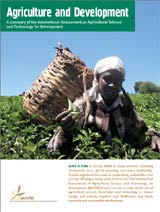



Professor Robert Watson, Director of the IAASTD SecretariatIf we do persist with business as usual, the world’s people cannot be fed over the next half-century. It will mean more environmental degradation, and the gap between the haves and have-nots will further widen. We have an opportunity now to marshal our intellectual resources to avoid that sort of future. Otherwise we face a world no one would want to inhabit.
Dr. Hans R Herren, World Food Prize Laureate, Co-Chair of the IAASTDOn a global scale, we have been producing sufficient food for an ever growing population. But this has been done at a cost that has left deep physical, biological and social scars, that now need the full attention of the scientific, moral and political authorities. This assessment highlights the presents reality and identifies options for action in a candid and sober manner.
Professor Judi Wakhungu, Co-Chair of the IAASTDWe cannot continue to work independently in our silos. We have an array of agricultural knowledge, science & technology tools that can solve the pressing food security challenges that we face.
The texts quoted in level 2 are directly sourced from the "![]()
The IAASTD addresses how to make better use of agricultural science, knowledge and technology to reduce hunger and poverty, improve rural livelihoods, and foster equitable and sustainable development.
Released on 15 April 2008, it represents a three-year effort by about 400 experts around the world working under the auspices of governments and representatives of civil society including nongovernmental organizations, producer and consumer groups and international organizations.
The executive summary of the IAASTD synthesis report was fully approved by the governments of 57 countries and welcomed with some reservations by the governments of 3 countries (Australia, Canada & USA). Countries are listed in the introductory statement and specific reservations in the Annex of the executive summary.
The assessment was sponsored by the United Nations, the World Bank and the Global Environment Facility (GEF), an independent financial organization that provides grants to developing countries. Five U.N. agencies were involved: the Food and Agricultural Organization (FAO), the U.N. Development Program (UNDP), the U.N. Environment Programme (UNEP), the U.N. Education, Science and Cultural Organization (UNESCO) and the World Health Organization (WHO). Additional individuals, organizations and governments participated in a peer review process.
The Level 1 is a faithful summary of the IAASTD Synthesis Report. It was produced by the GreenFacts under contract with COM+ Alliance.
Approved by the GreenFacts Scientific Board
The GreenFacts publication process is designed to ensure as high a degree of objectivity as possible.
The first draft of this digest was produced by the GreenFacts Editorial Team in January 2008.
The final draft of this digest was produced in February 2008 by GreenFacts
after peer review by scientists involved in the drafting of the IAASTD
report. The peer-review was coordinated by Dr Beverly McIntire (World Bank) and Professor Rik Leemans (Wageningen University) (see our
![]()
Peer-reviewers were:
Final publication was authorized by the President of the GreenFacts Scientific Board in April 2008, and the digest published on 15 April 2008.
15 April 2008
Agriculture & Development: New pressing challenges identified by international assessment
No update or revision at present.

This summary is free and ad-free, as is all of our content. You can help us remain free and independant as well as to develop new ways to communicate science by becoming a Patron!